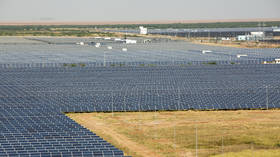Indian conglomerate eyes Australian market for making green energy equipment
Reliance Industries signed a deal with Brookfield investment fund to explore opportunities in Australia
Billionaire Mukesh Ambani’s Reliance Industries, India’s largest private sector company, announced on Tuesday that it signed an agreement with Canadian multinational Brookfield Asset Management to explore the possibility of manufacturing renewable energy and decarbonization equipment in Australia, Indian media reports.
The Indian petrochemical-to-telecom conglomerate, which had a market capitalization of $212.5 billion as of last month, stated that it will partner with Brookfield to raise direct capital investments and carry out assessments for its operations in Australia, including manufacturing or assembling renewable energy equipment and creating a robust supply chain mechanism.
In March, Brookfield announced that it would invest between $13 billion and $20 billion over the next ten years in Australia, along with its partners in renewable energy projects.
Reliance has been aggressively expanding outside its core oil-to-chemicals business to consumer sectors such as retail and telecom. It has also made a big push in the green energy domain, and the company is building factories at Jamnagar in Ambani’s native state of Gujarat to produce solar cells and modules, energy storage batteries, fuel cells, and green hydrogen. The conglomerate is also exploring options of setting up a green hydrogen plant in Western Australia, which has emerged as an attractive investment destination because of the availability of vast stretches of land and low cost for renewable energy.
Western Australia has over 30 hydrogen projects in various stages of planning, including H2Perth Hydrogen, a proposed $1 billion domestic and export-scale hydrogen and ammonia production facility in Kwinana, a southwestern suburb of Perth. Besides Reliance, Indian energy majors such as ReNew Power and ACME Group are aiming to tap into Western Australia’s green energy ecosystem.
The Indian private sector’s interest in clean energy in Australia coincides with Prime Minister Narendra Modi’s recent visit in May, when both nations agreed to set up a green hydrogen task force to jointly develop resources for renewable energy.
In February 2022, India and Australia signed a letter of intent on renewable energy that seeks to reduce the costs of technologies and help curb global emissions. The collaboration with India expands Australia’s existing low emissions technology partnerships with Germany, Singapore, Japan, South Korea, and the UK.
Additionally, the Australia-India Economic Cooperation and Trade Agreement, which came into force last December, can help New Delhi achieve its ambitious clean energy targets by supplying lithium and other critical minerals.
India aims to meet 50% of its energy requirements through renewable energy and the rapid expansion of electric mobility to 30% of total vehicles by 2030. The Modi government has identified 21 of Australia’s 49 vast critical minerals’ reserves that can play a key role in strengthening New Delhi’s supply chains. Australia also has the potential to be one of the top suppliers of cobalt and zircon to India and also other critical minerals such as antimony, lithium, rare earth elements, and tantalum.
You can share this story on social media:








Comments are closed.